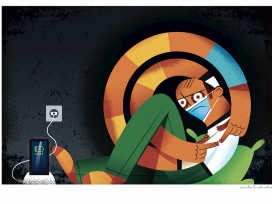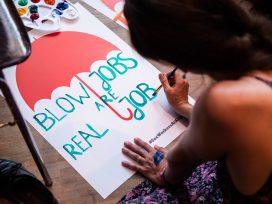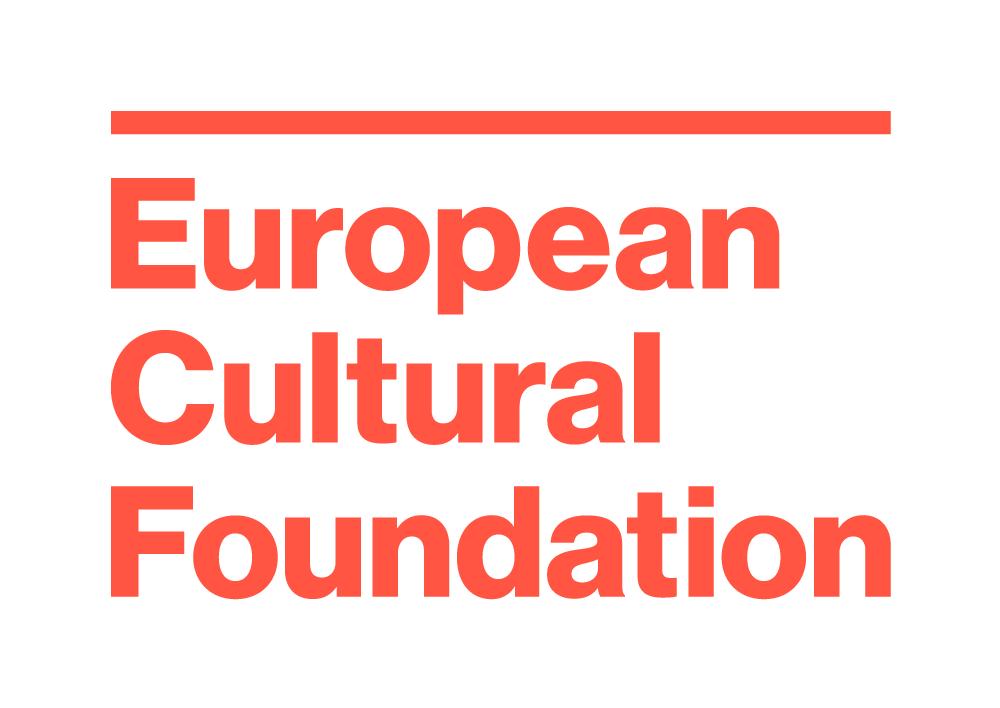Scientific pundits fear that the spread of anti-science will destroy western civilization, while covid-sceptics panic about a lurking dictatorship in which freedoms are sacrificed to healthcare measures. Where is the truth? And how is the ongoing public health crisis changing our relationship with science?
To the public mind, science and esoteric terminology become indissolubly linked … Partly as a result of scientific advance, therefore, the population at large has become ripe for new mysticisms clothed in apparently scientific jargon. … The borrowed authority of science becomes a powerful prestige symbol for unscientific doctrines.
These sentences are from a lecture by Robert Merton, an icon of modern sociology. The talk was delivered in 1937, almost 75 years ago. Although Merton was not an alarmist, he pointed at the ‘increasing gap between the scientist and the laity’ as a dangerous trend in industrialised societies.1
It is hard not to see Merton’s thoughts as prophetic today, during the fourth wave of the coronavirus pandemic and the emergence of the Omicron variant, with dramatically rising death tolls in some countries of the First World. Romania, Bulgaria, or Croatia, for example, are all members of the European Union where vaccines are accessible for all adults – and increasingly, for children as well, but their majorities are reluctant to take them.
Scientists in the public eye: angelic devils
Most countries in Africa and South America can only dream of such vaccine availability that could save the lives of hundreds of thousands. And yet, a considerable portion of the population of North Atlantic countries have been unwilling to take it, even though most of them have been routinely inoculated with compulsory childhood vaccines, such as MMR against mumps, rubella and measles.
The most common arguments are that vaccines supposedly can have dangerous side effects or are simply unnecessary. But also, there are significant minorities in some European countries – who believe that COVID is simply fake, that the virus is a biological weapon in a geopolitical war, or that vaccines are a covert operation to inject microchips or programmable poison to control the population – or even to annihilate it. All these suspicions point to Big Pharma and an imaginary cabal of doctors, virologists and scientists, who supposedly want to impose their will on the people for greed or to gain political control.
Scientists sitting in their ivory towers, speaking a language that no one understands have always been easy targets for populist attacks. However, these attacks have traditionally been constrained to the fringes. But not anymore. In a populist Zeitgeist these arguments are mainstreamed. In June, a columnist for the Times published an article under an emblematic title: ‘With petty Covid rules running rampant, it’s this dictatorship of doctors that’s killing me’.The author, Rod Liddle issues an apocalyptic warning to British citizens: ‘we hand over the governance of our country to the medical clergy’.
Lockdowns, restrictions and healthcare measures (especially compulsory vaccinations) have strongly divided western societies. Even in countries where the vaccination rate is remarkably high – like in the UK or France – the hostility towards doctors is louder than ever before. It is not that anti-science is so popular everywhere, more that the arguments are way more visible – and it will have a lasting effect.
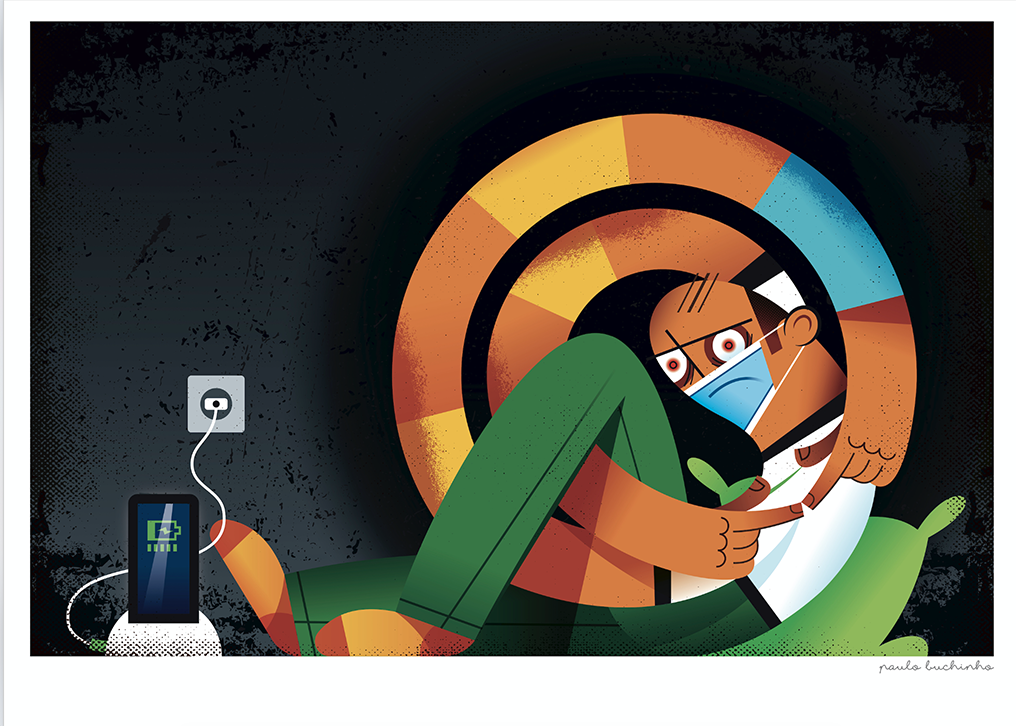
Paulo Buchinho for Fine Acts. Via thegreats.co
A superficial glance at the polls that show the glorification of science could make a very different impression and provide dangerous complacency. A recent Eurobarometer poll, conducted during April and May this year, showed a remarkably high trust in scientists. An optimist statement of the Commision cheerfully announced recently that ‘9 in 10 EU citizens (86%) think that the overall influence of science and technology is positive’; and also, that
EU citizens have a positive view of scientists and their defining characteristics, such as intelligence (89%), reliability (68%) and being collaborative (66%). More than two-thirds (68%) believe that scientists should intervene in political debates to ensure that decisions take into account scientific evidence.
But the very same poll also shows that not everyone is happy about the concept that doctors and scientists have a stronger influence on our lives. 28 percent of Europeans believe, for example, that viruses have been produced in secret laboratories to control our freedom, and 26 percent thinks that a cure for cancer already exists, but it is hidden from the public by commercial interests. This is a considerable minority, and these figures are shockingly higher in certain EU countries, especially in the West and the South.
58 per cent of Cypriots, 42 per cent of Greeks, 48 per cent of Hungarians, and 41percent of Bulgarians think that the cure for cancer exists but is hidden by Big Pharma. More than half of Cypriots, Bulgarians and Romanians think that COVID is produced in government labs to limit civil liberties. These theories are very popular among the least vaccinated cohorts – so it is hardly surprising that vaccination is very low in the latter two countries and infection rates and death tolls are skyrocketing.
Very much interlinked with the popularity of conspiracy theories, huge masses feel that science is mainly for the elites: the majority (57%) of EU citizens think that science and technology only help improve the lives of those who are already better off.
Also, while EU citizens express a strong interest in science, the relative majority of them (46%) admit that science is so complicated that they do not understand much about it, compared to a minority (28%) who say – or at least think – that they grasp something. And the results reveal some shocking gaps in scientific knowledge: one-fifth of the EU’s population think that the earliest humans lived together with dinosaurs (thanks, Jurassic Park!), and 23 per cent reject even the basic notion of evolution.
Of course, public opinion towards science has always been, and will be, volatile. Confidence in scientists is always fragile, as people cannot really trust in things they don’t understand. Scientists have rituals that layfolk cannot repeat or partake in. They know things that outsiders will never really grasp. Scientific findings can be counterintuitive. On the other hand, heavy reliance on our comfort of intuitive thinking can become a hotbed of pseudoscientific beliefs and conspiracy theories.
Increasing distrust in science
The Greek word Pharmakon, as Jacques Derrida noted, has a dual meaning: it can mean both ‘cure’ and ‘poison’. This ambivalence captures the public sentiment towards science nowadays. While in most western countries the majority sees scientific solutions as a cure, loud and significant minorities feel that scientists poison their lives.
When science and scientists radically intervene in everyday life, no wonder the response is a pseudoscientific revolution. Many say they want to take back control: fight for their perceived freedom to choose their own ways of medicalization or non-medicalization. Some are prepared to follow through with this even at the expense of their lives, as we can see in the case of vaccine deniers, whose chance to lose their lives is much higher than that of the vaccinated.
For large segments of pandemic-hit societies, especially for those who see themselves as the losers of the lockdowns, the pandemic resulted in higher levels of, as Stephen Lewandowsky calls it, motivated rejection of science – a phenomenon with some bizarre underlying rationality.
Image by rawpixel.com
For example, it is not surprising when the victims of lockdown (e.g. those who lost their jobs as a consequence) feel antipathy towards closures. But these seemingly rational responses are often accompanied by a stronger wave of embracing irrational beliefs which do not serve the self-interest of those who cultivate them.
Among these are not only conspiracy theories, but also pseudoscientific views, ranging from homoeopathy through all kinds of alternative medicine to magical cures, which many see as an alternative for the vaccines – expensive yet useless solutions are bet against the free option that saves lives.
The wellness industry has become a hotbed pseudoscience, Covid- and vaccine scepticism and conspiracy theories, promoting the claim that exercise, miracle diets and the lack of fear are the secret of health instead of masks, lockdowns and vaccines
Pseudoscientific revolutions often occur as a direct backlash against academic breakthroughs. It is exactly what happened during the pandemic: by prioritizing healthcare issues and pledging extraordinary support for research, enormous achievements were made possible, like the quick and efficient development of vaccines.
It has also boosted the market for both traditional and non-traditional, scientific and pseudoscientific medicines. Not only have the vaccines turned a huge profit for pharmaceutical companies, but people have started buying more medicine overall, and the revenue of pharmacies – mostly selling scientifically proven medicines – has increased dramatically as a result of COVID.
But paywalls and credit cards are important weapons in the hands of the pseudoscientific revolts as well. A study on the ‘pandemic profiteers’ concluded that anti-vaxxers represent a business empire with annual revenues of at least $36 million, – based on estimates for 22 organizations belonging to twelve of the industry’s biggest earners.
Anti-vaxxers, according to these calculations, had more than 62 million followers, and it brought up to $1.1 billion in annual revenue for Big Tech. The most prominent anti-vaxxers employ almost 300 people. They also received loans in the US through a federal program (Paycheck Protection Program, PPP) designed to help businesses through the crisis.
As the market of health is expanding, the pseudoscientific industry is rising globally. In Hungary, for example, a doctor turned hardcore virus-denier who sells his own vitamins that he alleges are the panacea for every problem, could increase his sales by 60 per cent, up to almost 100 000 euros (a huge figure in a country of 10 million). He famously said that even if he lay in a bathtub full of coronavirus, he would be fine; he called the virus a ‘hoax’; and he is constantly bashing the ’pharma mafia’ and the journalists as “merchants of fear”– all this while almost tripling the profits in his empire of companies, thanks to the virus.
Another company could multiply their revenues, thanks to the support of another virus-sceptical medical ‘celebrity’, György Gődény, who previously was the head of a sham party in Hungary. Both are members of ‘Doctors for a Clear Vision’, a group of pharmacologists and medical doctors spreading virus-scepticism and anti-vaxx views. One of them was a regional leader of the Chamber of Doctors before his suspension from this post. This is a stark reminder that even representatives of applied science can turn towards pseudoscience – some for profit, some out of conviction. And when they do, they can be the most credible messengers with their white lab coats, doctoral titles and healthcare degrees.
Of course, pseudoscience and alternative and complementary medicines (CAM) can spread even quicker and further in countries where it is more supported by cultural habits and traditions. Studies found that the use of such medicines is not only widespread, but also, culturally strongly embedded in South Asia including Pakistan, India, Bangladesh, Nepal, Sri Lanka, Afghanistan, Bhutan, and Maldives.
These cures can be especially popular when vaccines are not available: a study on COVID patients in India found, for example, that more than a quarter (25.8%) of patients used CAM during their treatment or after. But complementary and alternative medicines are going a long way, from the East to the West: demand for Chinese traditional medicine, including herbs, acupuncture, aromatherapy and other disciplines with no proven effect against COVID-19 have skyrocketed already during the first wave of the coronavirus.
What causes the backlash
Political revolutions are famously hard to predict. An important psychological theory rooted in Alexis de Tocqueville’s thoughts emphasizes the importance of the frustrated expectations: political violence and revolutions occur when reality underperforms the expectations of society, especially in terms of living standards and personal freedoms.
Pseudoscientific revolutions are usually much easier to foresee, but they similarly often emerge in times of social-political changes and crises. The 1918 Influenza epidemic (also known as the Spanish flu) claimed 50 million lives altogether, mostly in Europe. (In comparison: COVID-19 has so far killed 5 million globally). The 1918 crisis could spread so effectively because populations torn up by the Great War were reluctant to socially distance; politics on the national levels downplayed the importance of the virus; and many turned to obscure cures – such as whiskey, onion, snake oil, beff gray, saltwater or bloodletting – instead of medically sound preventive acts.

Alex Tait for Fine Acts Via thegreats.co
Lockdowns are exceptionally frustrating for most: the most human response to get through hardship by getting closer with one’s community, but the periodical deprivation of social life and curbing of free movement are obstacles. It’s not surprising that this rage of many turns against the machine.
Interestingly, pseudoscientific revolutions resist cheap generalizations. If we take a look at the huge differences in the vaccination figures in Europe, , it is clear that there isn’t a universal explanation as to why masses of people reject science and its products.
While EU countries have been facing similar restrictive measures and enjoy a similar abundance of vaccines, there is an enormous difference between their willingness to vaccinate themselves. The scale of the differences are striking: at the time of writing this article (late November 2021, at the peak of the fourth vawe), almost 90 per cent of Portuguese, and more than 80 per cent of Maltese and Spanish citizens are fully vaccinated – while only 25% of Bulgarians and 38% of Romanians are. The progress of vaccination in the latter countries is slow, despite the fact that both infections and mortality run dramatically high in some countries. In Romania, for example, daily mortality exceeded 400 cases a day at the beginning of November 2021, more than double of previous waves.
What can explain these striking differences? Even if our dataset in the EU is too small and imperfect to provide general explanations, we still can identify a few factors that clearly play an important role in fuelling pseudoscientific revolutions, and turn societies receptive to disinformation that destroys the reputation of science. Here are six of these factors.
#1. Distrust in authorities
One of the first comparative studies (of 19 countries) found that the most robust predictor behind accepting a vaccine is trust in the authorities: respondents who trusted information from government sources were more willing to take the vaccine and also, to listen to their employer’s advice to get vaccinated. This relationship was confirmed by many more studies since then.
In a recent piece, Khristen Godhsee and Mitchell Orenstein argue that in Central and eastern European countries, where the infections and deaths during the third and the fourth wave of the pandemic ran highest, public trust in authorities is way lower than in western Europe, and is further declining.
They explain this with a combination of a legacy of distrust from the socialist era and, even more importantly, the trauma of the transition that the three decades since could not really heal and repair. Looking at the graph above, we can see that in all the post-socialist EU member states, vaccination rates are lower than the EU average.
Of course, the population of these countries often have a good reason to distrust authorities, as they can easily abuse their power within weak, young democratic institutions – corruption, for example, is perceived as more endemic in eastern Europe than in the West. However, conspiracy mentality sees a plot even where there isn’t one.
Government corruption does not mean that they also want to kill people with vaccines – it wouldn’t be a good strategy to win elections, to start with. But of course, there is nothing new about the paranoid cognition and its impact on health behaviour.
Standing alone for a social distancing Image by rawpixel.com
In the Black community in the US, for example, the experiences with racial oppression and medical violence led to conspiracy theories suggesting that the HIV virus was created in governmental laboratories. Of course, morbid abuses of authority explains the distrust – cases such as the Tuskegee syphilis study, in which the federal medical authorities made a human experiment on around 400 underinformed black men, examining the progress of nontreated syphilis on their lives (and deaths). –. But now this suspicion ends up costing a lot of lives now within the Black community.
The results of dogmatic and paranoiac distrust can be devastating, reinforcing already existing inequalities. Populations who are the most exposed to abuse of power are the least willing to accept the hand of the government when it is extended to help – and not to beat, for once. Roma communities in Central Eastern Europe are a prime example for this.
Russian citizens also have a very good reason not to trust their openly oppressive president, with his personal empire and political opponents killed off, inside and outside Russia. But it is less rational if this distrust is mostly articulated in the rejection of vaccines. While the Sputnik V jab would clearly deserve trust, only 34% of Russians have been inoculated – while twice as many people, 67% approve President Putin according to the latest polls. As a result, both infections and mortality are hitting record heights in the country with more than 1200 reported deaths a day at the end of November 2021.
#2. Populism
Populist politics benefits the most from the distrust of authorities all around the globe – either in government or in opposition. All over Europe and beyond, typically far-right (and sometimes far-left) populist parties are riding the waves of COVID-skepticism and vaccine-reluctance, actively fueling the rise of pseudoscience.
This is an easy game: science is elitist by nature – at least in terms of who can participate in the production of knowledge. As one of the most original scholars of populism, Roger Brubaker puts it:
Populism is generally hostile to expertise, yet it has flourished at a moment when expertise has seemed more indispensable than ever.
Populism fills a political niche by articulating a suspicion towards governments and big pharma even in countries where vaccination rates are otherwise high, such as Italy, where there have been several huge anti-lockdown protests with protestors shouting ‘Libertad’, or France, where the French Rassemblement National, rejects the ‘pass sanitaire’.
Austria’s vaccination rates are closer to eastern, than western European levels, and the far-right FPÖ has become a loud advocate of ‘free decision’ on vaccination, also opposing lockdowns. Like all their international colleagues, they are calling for more personal freedom and more freedom of speech. Christian Hafenecker, the FPÖ media spokesman, for example, raised the question this August, criticizing the pro-vaccine stance of the public broadcaster: ‘Where are the reports and discussions where the opponents of the politics of forced vaccination and mask fetishism have their say?’ When new lockdowns were introduced in November 2021 to lower infections ahead of Christmas, the head of the party bluntly declared: ‘As of today, Austria is a dictatorship’.
The Belgian Vlaams Belang, the Estonian Conservative People’s Party, The Greek Solution, and the Romanian AUR are all playing the tunes of anti-lockdown and vaccine-scepticism, even if to varying extent. The far-right media ecosystem in Europe is often promoting alternative cures and solutions, raising the demand for pseudoscientific remedies, practices and thoughts, such as exercising and having fun with others help to prevent the corona. Anti-capitalist suspicion towards Big Pharma is shared by the globalization critical Left as well – but it is much weaker in Europe today.
The general rule is: the closer populists are to power, the higher the vaccine-scepticism is. In countries such as Romania and Bulgaria, populism is spread all over the political spectrum, creating a fertile breeding ground for baseless theories and vaccine denialism. Slovakia shows the lowest level of vaccination among the Visegrád countries (42%) with very high susceptibility to conspiracy theories – where two former prime ministers have been both playing to the tunes of vaccine hesitancy: Robert Fico and Peter Pellegrini.
But there are exceptions to this rule: Viktor Orbán, for example, is a harsh and aggressive promoter of vaccines, and the Hungarian vaccination rate (61%) is not tragic by Eastern European standards. Orbán boasts the fastest initial vaccine run, after fast-tracking the authorization of Russian and Chinese vaccines while other EU member states rejected to do so – and in some cases, with highly questionable results, like the high mortality among the elderly who were vaccinated with the Sinopharm jab, even despite the manufacturer’s recommendation. Orbán has called vaccine- and corona-scepticism a sin, asked people to lay their trust in science, and used the pandemic to fiercely (and unjustifiably) attack his opposition and public intellectuals – including myself – calling them anti-vaxxers and therefore posing a threat to the lives of fellow Hungarians.
At the same time, Orbán is one of the most radical nationalist politicians in Europe who signed a joint petition with the aforementioned far-right parties, and also, invited the notoriously vaccine-sceptic and anti-mask Tucker Carlson to Budapest this summer.
While the bromance between the pro-vaccine Hungarian government and the vaccine-sceptic paleoconservatives in the US seems bizarre, it might be increasingly indicative of the times which we are living in. Medical interventions and science can be a divisive topic not only between political camps, but within these camps as well. Science and anti-science live together.
#3.Polarization and political tribalism
Politics often tries to simplify this nuanced relationship. The nature of political polarization (or as I like to call it: political tribalism) is that it makes every public issue a subject to debate – leaving no topic untouched. If my political enemy takes a stance, I must take the opposite side, no matter the price. Jabs and masks are no exception, as the United States’ recent trajectory well exemplifies.
Research on the US found that media polarization in the early stages of COVID was a major factor in rendering the crisis politically divisive. The fact that politicians appeared in newspaper coverage more frequently than scientists, could have contributed to the polarization in attitudes towards COVID and vaccines.
Viktor Orbán’s aforementioned friend, Tucker Carlson himself is spreading wild conspiracy theories to this day, such as the fable that doctor Anthony Fauci created the coronavirus. He drew a parallel between sterilization, lobotomy and the vaccines, and refused to promote vaccines even after his TV channel, Fox News finally gave in to promoting the jabs. Carlson elevated the pop star Nicki Minaj’s tweets when she announced that she was not vaccinated and cited a ludicrous claim about a cousin’s friend’s swollen testicles. The government of Minaj’s home country, Trinidad and Tobago ended up officially fact-checking and refuting the claims, drawing international ridicule to the case.
The covid-scepticism and denial of hardcore Republicans seem to be dead wrong as a political strategy. Support for Trump has been found to be one of the most important predictors of vaccine unwillingness. Republican governors are more reluctant to use lockdown measures and to promote vaccinations. As a consequence, Republican states have developed higher infection and mortality rates as COVID figures kept rising. This shows that many Republican politicians are willing to put the lives of their own voters at risk.
Former contestant for the presidential nomination, Texas senator Ted Cruz has recently lashed out at Big Bird, a cartoon character from Sesame Street, for promoting vaccination in a tweet – a social media post which is anyway very unlikely to have reached the target demographic, since preschoolers are not too active on Twitter.
According to the study of Ivan Krastev and Mark Leonard based on an ECFR poll covering many European countries, the pandemic and protective measures have been clearly polarizing Europe and its societies among many axes: political, generational gaps and the East-West divide have become deeper as well. The perfect setting for the rebellion is when debates around science are fuelling up, and the topic becomes highly polarized. It has been happening in the US for a long time – and is happening in Europe now.
#4. Geopolitical battles and disinformation
Modern disinformation is essentially about creating polarization. But the causality is circular: polarization also provides a fertile ground for disinformation, both online and offline. And this is well exploited by geopolitical ‘merchants of doubt’: largely Russia and China.
Russian disinformation has long employed anti-science and pseudoscience to confuse societies and sow the seeds of doubt. In the 2016 US presidential elections for example, as a scientific study found, tweets originating from the Internet Research Agency – the infamous Russian troll farms – were sharing conspiracy theories and disinformation about viruses such as Ebola and Zika, as well as vaccine-skepticism and climate change skepticism more frequently than other kinds of bots.
Image by rawpixel.com
Proxies of the Kremlin have tried to undermine the trust in western COVID vaccines as well – an RFE/RL investigation found that a network of Russian marketing companies who previously sold dubious nutritional supplements and spread malware, were behind a coordinated disinformation campaign to demolish the trust in Western coronavirus vaccines, especially Pfizer. They spread lies about mortal side-effects of the vaccines, also trying to get western journalists involved in the campaign.
Russia is also suspected of having helped organize anti-lockdown protests in Ukraine in November. Protestors in Kyiv were displaying a sign: ‘I am a living human, not a product’. The QR-code on the same billboard points at the website of Putin’s United Russia Party.
Chinese media outlets also try to spread the news to external audiences, through the likes of the Global Times and CGTN. This summer they quoted a fictional Swiss doctor with the not-so-Swiss sounding name of Wilson Edwards, and a freshly created Facebook page – about the dangers of the US politicizing the virus. The Swiss Embassy responded with style: ‘While we appreciate the attention to our country, the Embassy of Switzerland must unfortunately inform the Chinese public that this news is false’.
State-related actors of disinformation are often hiding in plain sight. The Twitter feed of the Sputnik V vaccine, for example, is regularly spreading fake news about the side effects and lack of efficiency of Western vaccines. This communication has hurt the accreditation of the otherwise high-quality vaccine globally. In another instance, spokesman of the CPR’s Foreign Ministry Zhao Lijian himself claimed on his own official Twitter profile that COVID-19 was made in US military labs and brought to China by US soldiers attending the Army Games in Wuhan, where the first outbreak was discovered.
The malicious attempts of Russia and China, luckily, didn’t go unnoticed by the European Union. As the EAAS, the ‘foreign ministry’ of the EU concluded in a report: ‘Both Russia and China are using state-controlled media, networks of proxy media outlets and social media, including official diplomatic social media accounts, to achieve these goals.’ – i.e. to sow distrust.
The interesting paradox is that these merchants of doubt are aggressive promoters of science at the same time. Russia and China did their best to confuse Western societies, spread dangerous pseudoscientific views and undermine the trust towards western vaccines – with more success in southern and eastern Europe. At the same time, they also bet enormous resources to developing high-quality vaccines and to use them as a diplomacy tool, trying to buy loyalty in the world, including Europe (with notable success in Hungary and Serbia), and to distribute them to their own populations (with much more success in China than in Russia).
The weaponization of science denial is unfolding in parallel with strong scientific competition between the West, Russia, China. Pseudoscience, therefore, is partly a side-effect of the geopolitical rivalry in science. This phenomenon, of course, is not entirely new. We have already seen it during the Cold War period.. But this parallel is striking in itself: in light of the intensifying conflict between the North Atlantic Alliance vs. Russia and China with no signs of ease, this rivalry will provide fuel for such disinformation for a long time.
#5. Religion
Taking a look again at the map of countries in Europe, we see a clear religious divide as well: dominantly Orthodox countries all show relatively low vaccination rates. There is no exception to this rule: Greece, Bulgaria and Romania are all lagging behind the EU average, but we can see even deeper problems in Russia and Ukraine, for example.
The Orthodox church serves as a hotbed of covid-scepticism, anti-science sentiments and pseudoscientific beliefs, more than any other Christian mainstream institutional religion. Church leaders in Romania, for example, have constantly been labelling the COVID-vaccines as unsafe, and spreading conspiracy theories about them. Politicians do not dare to confront them, as they are afraid of a popular backlash. In Greece, priests have a leading role in the covid-sceptic, anti-vaccine movement.
In the United States, we can also find some correlation between religion and vaccine hesitancy (overlapping with their politics): the vaccination rate is lower in counties where the ratio of white evangelicals is higher.
But in the case of the Roman Catholic Church, we do not find such a strong clear and systemic impact. In the US. for example, Catholics were found to be the most vaccinated religious group. But of course, not everyone in the Catholic Church is so enthusiastic about vaccines than Francis Pope.
We can find vaccine hesitancy way beyond Christianity as well: Orthodox Jews had a high level of vaccine hesitancy both in the United States and in Israel. The religious leader of Iran, Ayatollah Ali Khamenei first questioned the very existence of COVID-19, later cited conspiracy theories about the virus, alleging it was a bioweapon ‘specifically built for Iran using the genetic data of Iranians’ – and then he recently banned Western vaccines from the country entirely. But the relationship between faith and attitudes towards science becomes complex: a recent study found for example that spirituality was more strongly associated to science scepticism than religiosity.
#6. Junk science and lack of science
Junk science is the poor quality and/or fraudulent research that adopts some aspects of the performance of academic inquiry, only to legitimize its false conclusions. This superficial pretence of knowledge production also helps the spread of anti-scientific propaganda.
The founding father of the modern anti-vaxx movement, Andrew Wakefield illustrates this dramatically. He published a bogus paper on the relationship between traditional MMR vaccines and autism in Lancet, one of the most prestigious medical journals in the 1990s. Wakefield had a clear reason to falsify data: he wanted to push his own vaccine he had just developed and submitted for a patent, by damaging the reputation of the rival product, the efficient traditional MMR.
The bogus paper was retracted many years later along with Wakefield’s doctor’s certificate, but the damage had already been done: the ‘autism theory’ made a huge career in the UK and beyond, and Wakefield is still a hero for anti-vaxxers. even more, his paper just became more credible in their eyes after it was retracted, as they allege, by Big Pharma.
A similar tendency has been rising through the pandemic, but on an industrial scale, putting many lives at risk, and underlining the responsibility of scientists. For example, a medical journal by the authentic-sounding title Vaccines published a peer-reviewed paper in late June with the title ‘The Safety of Covid-19 vaccinations – we should rethink the policy.’ The conclusion of the paper went viral on social media, with hundreds of thousands of shares, stating that Covid-19 vaccines are responsible for the death of two people for every three they saved. The paper then was retracted due to methodological problems but obviously, quite like Wakefield’s original tract, it did not stop the fake news from spreading at all. As Emerson Brooking from DFR Lab summarized the impact of junk science:
Once the paper is published, the damage is irrevocable (…) They are frequently the subject of viral online activity. Their findings are further filtered through salacious and misleading articles from fringe websites.
Adding insult to injury, weak science literacy (and behind that, possibly insufficient science education) can also help pseudoscience flourish. In the recent Eurobarometer poll mentioned above, European respondents had to do a ‘quiz’ of eleven scientific statements regarding issues such as the effect of antibiotics on virus vs. bacteria, the origins of global warming, the nature of the laser, and so on. The researchers then calculated an ‘accuracy score’ of these responses.
The responses show similar patterns to the vaccination rates mentioned above, only with much deeper gaps. In Romania and Bulgaria – again, at the bottom of the list – only 2 and 4 per cent of the respondents could give at least 8 correct responses, while this ratio was above 40 per cent in countries such as Belgium, Sweden, Ireland, and Luxembourg. All of them have decent vaccination rates, except for the latter.
Of course, correlation is not causation. But even if the relationship between science education and pseudoscience is not crystal clear, it is hard to imagine though that education systems wouldn’t play a prominent role in these huge differences, both by cultivating scientific literacy and directly building support for vaccines.
Studying science through experiences and experiments instead of just boring books might be the key difference. Understanding the causal links between education systems and the trust in applied science such as vaccines will definitely be one of the most important challenges and tasks ahead in the future for social scientists and teachers alike.
Can we, and should we tame pseudoscientific revolts?
With the COVID-19 pandemic, western societies received an unprecedented opportunity to strengthen the positions of science in education, public discourse and policy decisions alike. The question is: how can we use this opportunity to lessen the charm of a vast pseudoscientific revolution?
Before responding to this question, we have to note that there is no such thing as a total rational individual, nor society, and we should never set it as a norm. In doing so, we would fall into the trap of the Ten Commandments: setting the moral standards so high that ultimately nobody would be able to keep up with them.
Hardcore sceptics like Richard Dawkins often fail to acknowledge that humans will never be perfectly rational, no matter how we define rationality. Dawkins once infamously called faith ‘one of the world’s great evils, comparable to the smallpox virus but harder to eradicate’ – because religious beliefs cannot be proven wrong by evidence. This narrow-minded approach fails to recognize that emotions have their strong evolutionary value, not as subordinate remnants from the past, but as superordinate mechanisms evolved for coordination to solve complex adaptive problems.
Whether we like it or not, collective myths have played a crucial role in the survival of humanity. We should embrace certain forms of irrationality – such as arts, fiction, sports fandom and the likes, as they help us enjoy life and be productive. We need some myths and fiction also to cope with reality. It’s entirely normal that scientific and non-scientific, ‘irrational’ practices are both present in our lives. For example, a medical researcher can attend mandala yoga classes, acupuncture or religious practices after lab hours, and some doctors can believe that vaccines are God’s way to provide relief to humanity.
The problem is when science, non-science, and anti-science are dangerously and inseparably intertwined: if the religious practise or the yoga class would be substituted for the scientific practice itself. The problem with pseudoscience is not that it is ‘irrational’, but that it is disguised as science.
We should allow for certain forms of irrationality and the individual’s freedom to choose their personal beliefs in certain, harmless areas. This would also allow for setting firmer boundaries when it comes to matters of life and death, like vaccinations and other measures where one person’s behaviour can put others’ lives at high risk.
The post-truth kaleidoscope
If the status of science in Western society as an ultimate source of knowledge is undermined and confused with myths, the consequences can be a catastrophic pseudoscientific revolt.
We can find a dangerous pattern in all spheres of European publicity – even if to a varying degree. This is the strong trust in science and scientists, accompanied by a weak understanding of science and poor knowledge about scientific facts. It provides the ultimate opportunity for pseudoscientific entrepreneurs, who can use all the superficial features of science – lab coats, spectacles and fake (or sometimes even real) medical degrees, and bullshit terminology – to earn the admiration of the audience and to sell their often dangerous cures, books and practices.
As Marci Shore brilliantly put it in her essay: the nature of post-truth is that it replaces the epistemological uncertainty about the facts in the world with an ontological one. The former is to acknowledge the imperfection of our ability to separate between facts and non-facts – which is absolutely appropriate, as the basis of knowledge is the ability to draw its limits. But the latter is about questioning if facts exist at all, and whether they can even theoretically be separated from non-facts and fiction.
This uncertainty about the existence of facts is the most dangerous result of post-truth or a pseudoscientific revolution. It can result in a worldview where nothing is true and everything is possible, all facts can be confronted with ‘alternative facts’, all experts and scientific findings are facing a counterargument alternative, and the choice is merely a matter of taste. While it seems highly democratic, it leads to the fragmentation of knowledge where there are no facts, just the endless kaleidoscope of subjective realities.
How to counter the anti-science counterrevolutions?
Scientific communities should not take trust and admiration as granted. Instead, they have to fight for that day by day. In her book Why Trust Science? Naomi Oreskes argues for three important merits in the scientific community: honesty, diversity and humility.
First, scientists should be open, transparent and honest about their values, especially when it comes to the humanities. Second, scientists should embrace diversity to be able to identify and exclude junk scientists:
… a community with diverse values is more likely to identify and challenge prejudicial beliefs embedded in, or masquerading as scientific theory.
Third, scientists should be humble so that they can revise their knowledge based on new evidence, as ‘even the best of scientists should remember that a complete grasp of the whole truth is yet far beyond us.’ So, according to Oreskes, science deserves the trust of the public ‘when an expert consensus emerges in a scientific community that is diverse and characterized by ample opportunities for peer review and openness to criticism.’
The merit of humility, we can add, also implicates that knowledge production needs to also contain the work of disseminating results to a wider audience and prioritize communicating in an accessible and less esoteric way – as much as the scientific accuracy allows them.
Humility and generosity would pay off in the geopolitics of vaccines as well: while Western politicians are chasing their citizens with the third and fourth vaccines, vaccines are a rarity in the Third World. A more even distribution of vaccines in the World would make it less likely that more and more deadly variants are appearing in the peripheries, leading to higher death rates in the West.
Honesty implies that scientists should not pretend that they always know the ultimate truth. Early false predictions have seriously damaged the public trust in science and fuelled conspiracy theories. So have controversial recommendations – such as the WHO advising early on against face masks.
Scientists and decision-makers should refrain from tactical, paternalistic deception of the public, as it will hit back as a boomerang anyway. And scientists should not shy away from admitting ‘we do not know at this point’, or adding that their advice is ‘according to our best knowledge’.
Representatives of science have long been expected to talk with absolute certainty – but they should openly and consciously refuse to fulfil these unrealistic expectations that go against the very nature of science, where the evolution of knowledge is not linear, mistakes are natural, and correction is inevitable.
Thomas Kuhn quotes Francis Bacon in agreement in his – literally paradigmatic – book The Structure of Scientific Revolutions:
Truth emerges more readily from error than from confusion.
Education can help a lot in separating fact from fiction – through interesting personal experiences with science and gamification. The latter was found to be highly efficient in separating real news from fake news, and we can assume it can also help to tell apart real science from pseudoscience by helping to identify the features of pseudoscience (e.g. the inherent conspiracy worldview). Science education could put a stronger emphasis on defining science through its relationship with pseudoscience – as it is more interesting and more engaging than just learning the abstract principles and methods of scholarly inquiry.
Ultimately, individuals will have to learn a new way of source criticism, so to identify swindlers and not take them at face value. The fact that someone has a medical degree or uses obscure terminology does not mean that they should be taken seriously.
It also needs to be acknowledged that not knowing things is ok – but also, to stay silent about things that we do not know about. The famous Kruger-Dunning effect is cognitive bias, in which people with little understanding of a field are failing to recognize their ignorance exactly because they lack the sufficient knowledge to judge their incompetence – and therefore, are confidently taking positions and arguing in issues they have no knowledge at all. But this effect can be overcome, or at least reduced if we make people aware of this uncomfortable truth about the boundaries of our knowledge.
Robert Merton perfectly summarized the challenge of the transfer of scientific knowledge half a century ago:
With the increasing complexity of scientific research, a long program of rigorous training is necessary to test or even to understand the new scientific findings. The modern scientist has necessarily subscribed to a cult of unintelligibility. There results an increasing gap between the scientist and the laity.
Without closing this gap, the foundations of our ‘modern’ and ‘enlightened’ societies, once thought rock-solid, won’t be able to withstand pseudoscientific revolutions.
Merton, R. K., The sociology of science: Theoretical and empirical investigations. University of Chicago Press (1973) 263-264.
Published 6 December 2021
Original in English
First published by Eurozine
Contributed by Institute for Human Sciences Vienna (IWM) © Péter Krekó / Institute for Human Sciences (IWM) Eurozine
PDF/PRINTIn collaboration with
In focal points
Newsletter
Subscribe to know what’s worth thinking about.
Related Articles
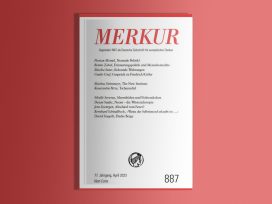
Colonial genocide and law
Merkur 4/2023
German policy on colonial genocide: legal responsibility via a collective right of memory? Also: colonial currencies and relationships of debt, and the problem with the Federal Constitutional Court’s doctrine of neutrality.
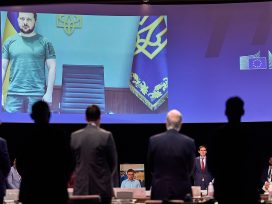
The war crimes charges brought by the ICC against Putin are a breakthrough. But built-in safeguards of national interest, combined with an incomplete patchwork of mechanisms and jurisdictions, mean a long way ahead before Russia is prosecuted under international law for the crime of aggression.


